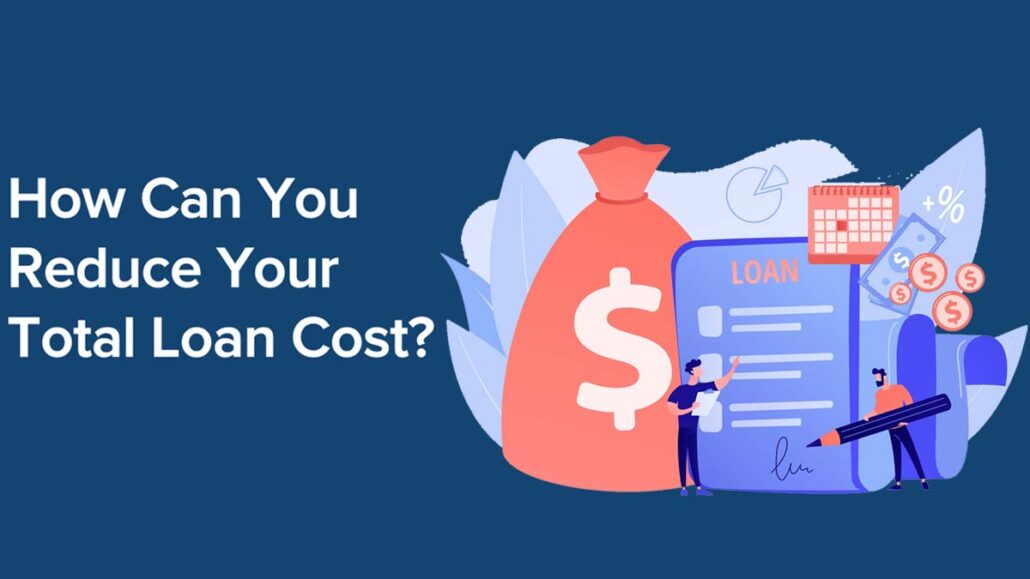Are you looking to minimize the overall cost of your loan? Discover practical strategies to reduce your total loan cost and save money.

Debt can feel overwhelming, but the good news is there are ways to fight back and reduce the total amount you owe. In this article, we’ll explore strategies for lowering your loan costs and saving you money in the long run. Whether you’re dealing with student loans, auto loans, or other types of debt, this guide will equip you with actionable tips to take control of your finances and free up more cash flow.
Loans can be a helpful tool to achieve your financial goals, but they also come with the burden of interest. By taking some proactive steps, you can significantly reduce the total cost of your loan and save yourself a significant amount of money in the long run.
Key Factors Affecting Loan Costs
Before diving into specific strategies, it’s important to understand the key factors that influence your total loan cost:
- Interest Rate: The interest rate is the percentage of the loan amount that you pay the lender for borrowing the money. A lower interest rate translates to a lower total loan cost.
- Loan Term: The loan term is the length of time you have to repay the loan. Shorter loan terms typically come with higher monthly payments but ultimately less interest paid overall. Conversely, longer loan terms have lower monthly payments but accrue more interest over time.
- Origination Fees: Some lenders charge origination fees, which is a one-time upfront fee for processing the loan application.
Strategies to Reduce Your Total Loan Cost
- Improve Your Credit Score: A higher credit score qualifies you for better interest rates on loans. Work on improving your credit score by paying bills on time, keeping credit card balances low, and maintaining a healthy credit mix.
- Shop Around and Compare Loan Offers: Don’t settle for the first loan offer you receive. Get quotes from multiple lenders to compare interest rates, fees, and loan terms.
- Make Extra Payments: Whenever possible, try to make extra payments towards your loan principal. This reduces the outstanding balance faster, saving you money on interest.
- Refinance Your Loan: If interest rates have dropped since you took out your loan, refinancing to a lower interest rate can significantly reduce your total loan cost.
- Explore Loan Forgiveness Programs: Depending on your loan type and profession, you may be eligible for loan forgiveness programs that discharge a portion or all of your loan balance after a certain number of qualifying payments.
Proactive Steps to Save on Loans
- Borrow Only What You Need: It’s tempting to borrow more than you need, but resist the urge. Only borrow what you absolutely need and can afford to repay comfortably.
- Explore Scholarships and Grants: Before resorting to loans, exhaust all scholarship and grant opportunities to minimize your reliance on borrowed funds.
- Make Payments on Time: Missing loan payments can result in late fees and penalties, increasing your total loan cost.
- Set Up Automatic Payments: Enrolling in automatic payments ensures you never miss a payment, which can incur late fees and damage your credit score. Some lenders even offer a slight interest rate reduction for setting up autopay.
- Round Up Your Payments: Consider rounding up your monthly payment to the nearest hundred and applying the extra amount towards the principal.
- Prepay During Grace Periods: Some loans offer grace periods where you can make payments without accruing interest. Take advantage of these periods to prepay and reduce your loan balance.
FAQs
What is the difference between a fixed interest rate and a variable interest rate?
A fixed interest rate remains the same throughout the loan term. A variable interest rate can fluctuate over time.
How can I improve my credit score quickly?
Making all your bill payments on time and keeping your credit card balances low are two of the most impactful ways to improve your credit score quickly.
What are the risks of refinancing a loan?
Refinancing may come with new origination fees and could potentially extend your loan term. Carefully evaluate the new loan terms before refinancing.
How much money can I save by making extra payments?
The amount of money you can save by making extra payments depends on the loan amount, interest rate, and the amount of the extra payment. You can use online loan calculators to estimate your potential savings.
Can I negotiate the interest rate on my loan?
Yes, you can negotiate the interest rate on some loans, particularly private loans. Having a good credit score and comparing offers from other lenders strengthens your negotiating position.
What are the downsides of refinancing a loan?
Refinancing might incur additional fees, and you might end up extending your loan term, so carefully evaluate the potential benefits and drawbacks before refinancing.
What if I can’t afford my monthly loan payments?
If you’re struggling to make your monthly loan payments, contact your lender immediately. They might offer hardship programs or repayment options that can ease your burden.
Conclusion
By implementing these strategies, you can significantly reduce your total loan cost and free up precious financial resources. Remember, consistency is key. Stick to your plan, and watch your loan burden shrink. Now go forth, conquer your loans, and take control of your financial future!

